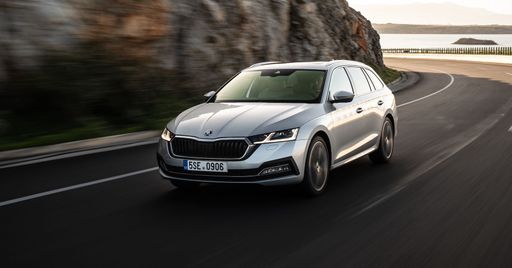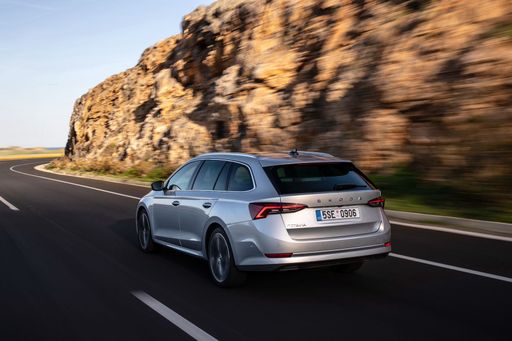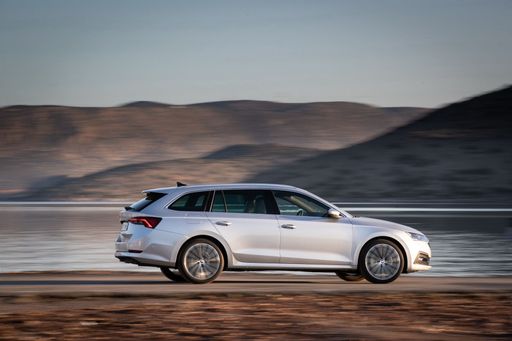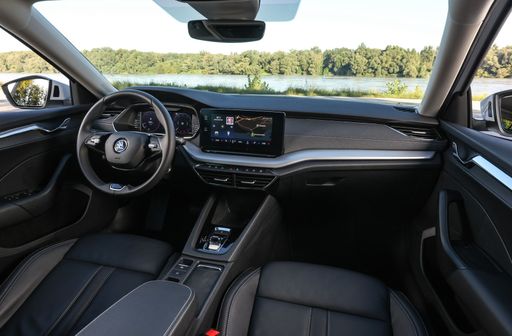Skoda Octavia Combi vs VW Tiguan - Differences and prices compared
Compare performance (265 HP vs 272 HP), boot space and price (24400 £ vs 33300 £) at a glance. Find out which car is the better choice for you – Skoda Octavia Combi or VW Tiguan?
Costs and Efficiency:
Looking at overall running costs, both models reveal some interesting differences in everyday economy.
Skoda Octavia Combi has a clearly perceptible advantage in terms of price – it starts at 24400 £, while the VW Tiguan costs 33300 £. That’s a price difference of around 8880 £.
Fuel consumption also shows a difference: VW Tiguan manages with 1.40 L and is therefore clearly more efficient than the Skoda Octavia Combi with 4.40 L. The difference is about 3 L per 100 km.
Engine and Performance:
Under the bonnet, it becomes clear which model is tuned for sportiness and which one takes the lead when you hit the accelerator.
When it comes to engine power, the VW Tiguan has a hardly perceptible edge – offering 272 HP compared to 265 HP. That’s roughly 7 HP more horsepower.
In acceleration from 0 to 100 km/h, the VW Tiguan is to a small extent quicker – completing the sprint in 5.90 s, while the Skoda Octavia Combi takes 6.50 s. That’s about 0.60 s faster.
In terms of top speed, the Skoda Octavia Combi performs barely noticeable better – reaching 250 km/h, while the VW Tiguan tops out at 242 km/h. The difference is around 8 km/h.
There’s also a difference in torque: VW Tiguan pulls hardly perceptible stronger with 400 Nm compared to 370 Nm. That’s about 30 Nm difference.
Space and Everyday Use:
Cabin size, boot volume and payload all play a role in everyday practicality. Here, comfort and flexibility make the difference.
Both vehicles offer seating for 5 people.
In curb weight, Skoda Octavia Combi is somewhat lighter – 1366 kg compared to 1599 kg. The difference is around 233 kg.
In terms of boot space, the VW Tiguan offers barely noticeable more room – 652 L compared to 640 L. That’s a difference of about 12 L.
In maximum load capacity, the Skoda Octavia Combi performs minimal better – up to 1700 L, which is about 50 L more than the VW Tiguan.
When it comes to payload, Skoda Octavia Combi hardly perceptible takes the win – 534 kg compared to 533 kg. That’s a difference of about 1 kg.
Who comes out on top?
Overall, the VW Tiguan shows itself to be wins the duel decisively and secures the title of DriveDuel Champion.
It convinces with the more balanced overall package and proves to be the more versatile choice for everyday use.

VW Tiguan
Costs and Consumption
View detailed analysis
Engine and Performance
View detailed analysis
Dimensions and Body
View detailed analysis
Skoda Octavia Combi
The Skoda Octavia Combi is the sensible family wagon that somehow turns grocery runs and long trips into a pleasant, unshowy experience — spacious, practical and built like it prefers reliability over flash. With smart touches, clever storage and a cabin that feels grown-up rather than frugal, it’s an easy recommendation for buyers who want maximum utility without sacrificing comfort or style.
details



VW Tiguan
The VW Tiguan blends sensible family practicality with a dash of German polish, delivering a calm, reassuring ride and a cabin that never feels like an afterthought. For buyers who want an SUV that’s easy to live with yet still nicely dressed, the Tiguan is the grown‑up choice that keeps a cheeky wink in reserve.
details






|

|
|
|
|
Costs and Consumption |
|
|---|---|
|
Price
24400 - 42300 £
|
Price
33300 - 51900 £
|
|
Consumption L/100km
4.4 - 6.9 L
|
Consumption L/100km
1.4 - 8.4 L
|
|
Consumption kWh/100km
-
|
Consumption kWh/100km
-
|
|
Electric Range
-
|
Electric Range
118 - 126 km
|
|
Battery Capacity
-
|
Battery Capacity
19.70 kWh
|
|
co2
113 - 157 g/km
|
co2
32 - 190 g/km
|
|
Fuel tank capacity
45 - 55 L
|
Fuel tank capacity
45 - 58 L
|
Dimensions and Body |
|
|---|---|
|
Body Type
Estate
|
Body Type
SUV
|
|
Seats
5
|
Seats
5
|
|
Doors
5
|
Doors
5
|
|
Curb weight
1366 - 1553 kg
|
Curb weight
1599 - 1890 kg
|
|
Trunk capacity
640 L
|
Trunk capacity
490 - 652 L
|
|
Length
4698 - 4709 mm
|
Length
4539 mm
|
|
Width
1829 mm
|
Width
1842 - 1859 mm
|
|
Height
1455 - 1468 mm
|
Height
1656 - 1658 mm
|
|
Max trunk capacity
1700 L
|
Max trunk capacity
1486 - 1650 L
|
|
Payload
471 - 534 kg
|
Payload
460 - 533 kg
|
Engine and Performance |
|
|---|---|
|
Engine Type
Petrol, Petrol MHEV, Diesel
|
Engine Type
Petrol, Petrol MHEV, Diesel, Plugin Hybrid
|
|
Transmission
Automatic, Manuel
|
Transmission
Automatic
|
|
Transmission Detail
Dual-Clutch Automatic, Manual Gearbox
|
Transmission Detail
Dual-Clutch Automatic
|
|
Drive Type
Front-Wheel Drive, All-Wheel Drive
|
Drive Type
All-Wheel Drive, Front-Wheel Drive
|
|
Power HP
116 - 265 HP
|
Power HP
130 - 272 HP
|
|
Acceleration 0-100km/h
6.5 - 10.7 s
|
Acceleration 0-100km/h
5.9 - 10.6 s
|
|
Max Speed
203 - 250 km/h
|
Max Speed
210 - 242 km/h
|
|
Torque
220 - 370 Nm
|
Torque
220 - 400 Nm
|
|
Number of Cylinders
4
|
Number of Cylinders
4
|
|
Power kW
85 - 195 kW
|
Power kW
96 - 200 kW
|
|
Engine capacity
1498 - 1984 cm3
|
Engine capacity
1498 - 1984 cm3
|
General |
|
|---|---|
|
Model Year
2024 - 2025
|
Model Year
2024 - 2025
|
|
CO2 Efficiency Class
E, F, D, C
|
CO2 Efficiency Class
G, D, E, F, B
|
|
Brand
Skoda
|
Brand
VW
|
Is the Skoda Octavia Combi offered with different drivetrains?
The Skoda Octavia Combi is available as Front-Wheel Drive or All-Wheel Drive.
The prices and data displayed are estimates based on German list prices and may vary by country. This information is not legally binding.
